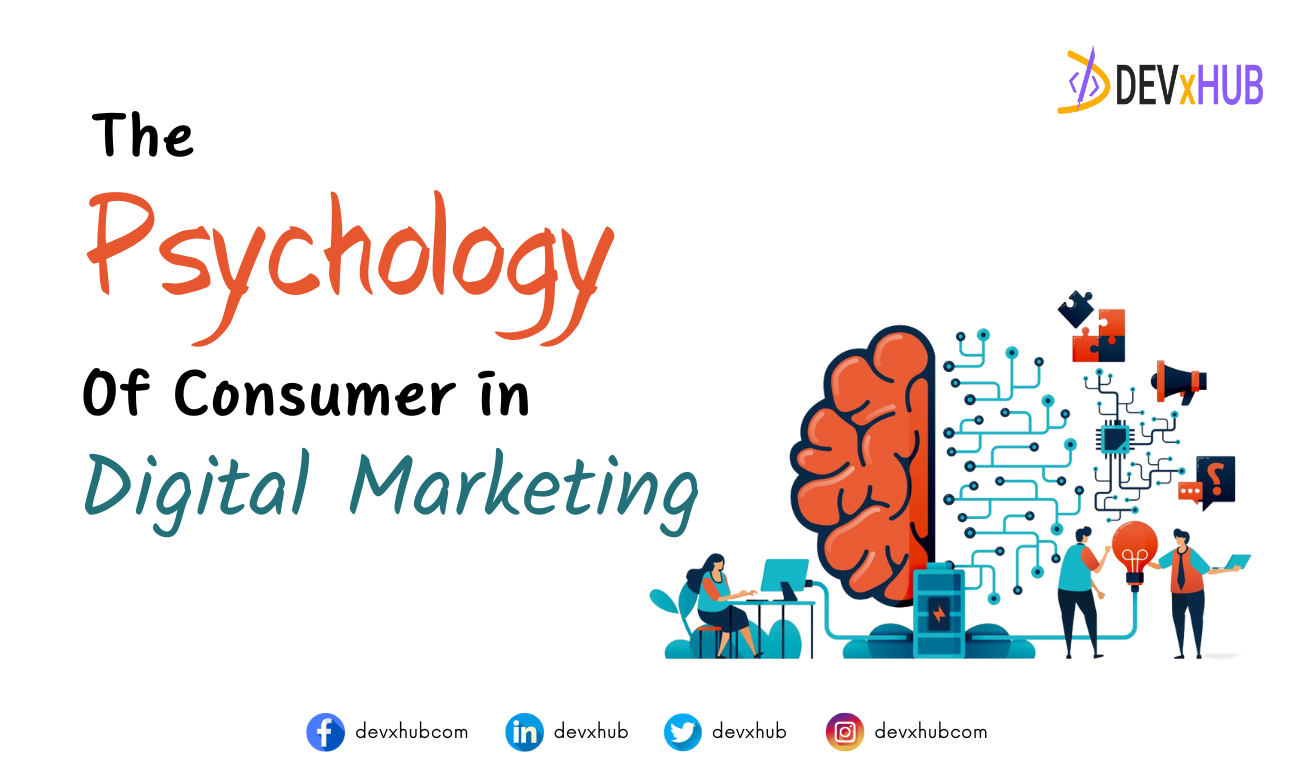Blog - The Psychology of Consumer in Digital Marketing
The psychology of consumers in digital marketing explores how people think, feel, and make decisions online. It’s about understanding their cognitive biases, emotions, and behaviors to create effective marketing strategies. By leveraging psychological insights, businesses can better connect with consumers, boost engagement, and drive online success.
What is digital psychology?
Digital psychology, also known as cyberpsychology or internet psychology, is a subfield of psychology that focuses on the study of how digital technology and the internet impact human behavior, cognition, and emotions. It explores the ways in which technology, particularly digital and online platforms, influence individuals and society as a whole. Digital psychology encompasses various aspects of human-computer interaction, online communication, and virtual environments.
Digital psychology is a multidisciplinary field that draws on psychology, sociology, communication studies, computer science, and other related disciplines. As technology continues to play an increasingly prominent role in our lives, the study of digital psychology becomes even more relevant in understanding how it shapes human behavior and mental health in both positive and negative ways.
The role of digital psychology
In our world, numbers and statistics are everywhere. Tracking WHAT your consumers are doing is now simpler than ever thanks to tools like Google Analytics. Digital psychology, however, reveals WHY they are doing it.
In the end, digital psychology aims to provide an explanation for why your customers act in a certain way. It seeks to show you how to develop an online communication style that appeals to the subconscious mind.
Basically, how you can optimize your customer journey to make it more engaging, persuasive and effective!
Digital psychology helps optimize digital marketing strategies where raw numbers cannot. This deep level of understanding lends itself to multiple areas within the online world.
A strategic perspective on the role of digital psychology in the digital marketing landscape. This is not a trick in itself. It’s a way of thinking that can be applied across the digital marketing mix at a strategic level.
All marketing efforts should be attributed to consumer psychology principles at the planning stage.
Psychology of Consumer Behavior in Digital Marketing.
The psychology of consumer behavior is an essential aspect of digital marketing. Marketing experts that have a solid understanding of how consumers think, feel, and behave may develop digital marketing strategies that connect with their target demographic. The following are some critical consumer psychology considerations for digital marketing campaigns:
Understanding consumer motives is necessary for efficient usage of digital marketing. Numerous elements, such as the need for ease, self-fulfillment, status, and social connection, influence consumer behavior. By comprehending what motivates your target audience, you can develop messages that resonate with them.
Make sure your website is emotionally appealing
Effective websites bring out an emotion in shoppers. That emotion might be relief when they see your service can solve a problem for them, or simply the appreciation of aesthetically pleasing photos and graphics. Regardless, having a professionally designed website builds trust with your customers. The way your website looks will determine how shoppers interact with it — people are less likely to shop a website if it isn’t visually pleasing. So make sure your photos are high quality, the color story makes sense and that text is properly aligned. This applies to your email marketing and digital ads as well.
Customers Emotions:
Emotions are important in determining decision-making, brand loyalty, and purchasing habits among consumers. Using digital marketing, you may use emotional ties to your audience to increase engagement and brand loyalty.
The entrenched tendencies to think and act in particular ways are known as cognitive biases. By being conscious of these biases, marketers can develop persuasive communications and marketing plans. The tendency for people to seek out information that confirms their own thoughts is known as the “confirmation bias,” and it may be used to your advantage when crafting message that supports the goals and beliefs of your target audience.
Social media platforms offer good opportunities for marketers to take use of social influence, which is a potent driver of customer behavior. Marketing professionals can create social media strategies that promote engagement and sharing by having a better understanding of the impact that social influence plays in customer behavior.
Consumer decision-making:
Creating successful digital marketing strategies requires a thorough understanding of consumer decision-making processes. The decision-making process that consumers go through entails problem recognition, information search, alternative appraisal, and purchase decision. Marketers that are aware of this process can create content and marketing that speaks to each stage of the decision-making process.
In general, knowing consumer psychology is necessary to develop effective digital marketing techniques that resonate with your target demographic. By having a deeper understanding of customer motivations, emotions, cognitive biases, social impact, and decision-making processes, marketers may develop messaging and marketing strategies that are more effective and improve engagement and sales.
How to use consumer psychology in marketing online
To feel confident buying from you, especially online when they can’t see or touch the product first, people need to trust your brand. The conviction that others have attempted something and that your efforts to copy them are justified is known as social proof. By displaying reviews, testimonials, video interviews, and affiliations, you can generate social proof online. Social proof is also increased by having a large social following.
Conclusion
In the digital marketing landscape, understanding consumer psychology is an ongoing process. By recognizing the factors that influence consumer behavior and adapting strategies accordingly, marketers can create more effective, ethical, and consumer-centric campaigns. Ultimately, the key to success lies in building authentic relationships with consumers and delivering value in the digital realm.
Related Posts
Categories
- App Development (2)
- Design (2)
- DEVxHUB (30)
- Digital Marketing (2)
- Guide (24)
- It Bangladesh (1)
- Logo design (1)
- Operating system (1)
- Personal Improvement (14)
- Planning (4)
- Project management (3)
- Social media (2)
- Software Development (5)
- Software Quality Assurance (8)
- Startups (1)
- Team work (1)
- UI UX (1)
- Web Development (6)
Main Tags
- 2024
- Android
- app development
- bangladesh
- content writing
- design
- devxhub
- Digital marketing
- Guide
- IOS
- It
- logo design
- Operating system
- Personal Improvement
- planning
- project management
- social media
- Software Development
- Software Quality Assurance
- software testing
- software testing types
- Startups
- Success
- team
- UI UX
- UI UX design
- VR
- Web Development















